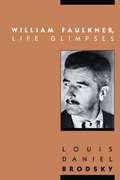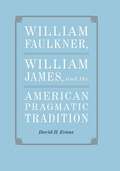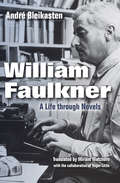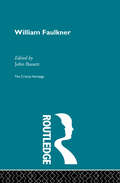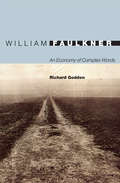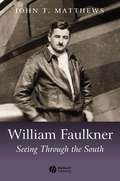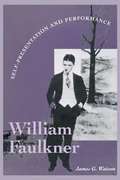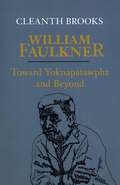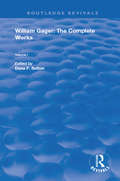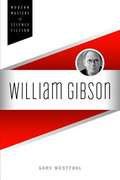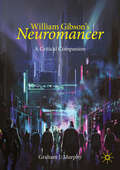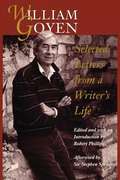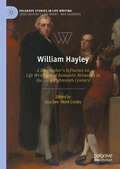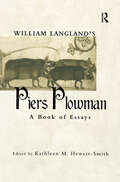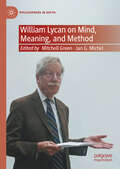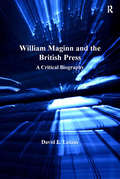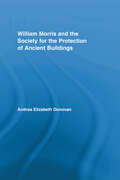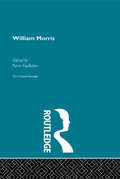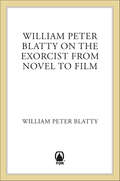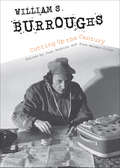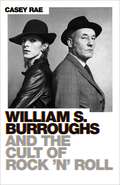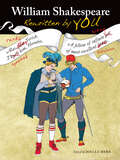- Table View
- List View
William Faulkner, American Writer: A Biography
by Frederick R. KarlFrom the book: "This book attempts to integrate the latest in biographical information with Faulkner's own large body of work in fiction and poetry. It will not replace Joseph Blotner's monumental two-volume biography of Faulkner, which is an altogether different kind of book. I have not attempted to duplicate the full range of details of Faulkner's life that Professor Blotner has so ably researched and presented; but I have used the materials of Faulkner's work as biographical data in ways Professor Blotner did not attempt or intend to do. By integrating life and work, I have tried to avoid a chronicle or linear life study, which in other circumstances has its own kind of value. This study is in the deepest sense a biography: not only a presentation of the relevant facts of the subject's life, but an effort to understand and interpret that life psychologically, emotionally, and literarily. It tries to put Faulkner together- if not entirely as an understandable man then as a man who may be understood as America's greatest novelist of the twentieth century."
William Faulkner, Life Glimpses
by Louis Daniel BrodskyDuring thirty years of literary collecting, Louis Daniel Brodsky has acquired some of the most important source materials on the life and work of William Faulkner anywhere available. Indeed, the Brodsky Collection, now owned by Southeast Missouri State University, has been characterized by Robert Penn Warren as "stupendous. " In William Faulkner, Life Glimpses, Brodsky mines this storehouse of previously unpublished material, using interviews, letters, speeches, movie scripts, and notes to enrich our understanding of this well-known Southern writer. The result is a highly readable biography that is thematic and episodic rather than chronological in its organization. Building on specific documents in the collection, Brodsky opens new windows on the parallel development of Faulkner's literary career and personal life. New material on the early poems ''Elder Watson in Heaven" and "Pregnancy" gives insight into Faulkner's developing literary and personal aesthetics during the 1920s and 1930s. Faulkner's metamorphosis from self-doubting, isolated artist to confident public spokesman during the 1940s and 1950s forms the central core of the study. Through previously unavailable screenplays written for Warner Bros. during World War II and an interview with Faulkner's fellow screenwriter Albert I. "Buzz" Bezzerides, Brodsky charts the decline in Faulkner's literary output and his corresponding discovery of a public voice. He shows how Faulkner's astonishingly positive 1950 Nobel Prize acceptance speech was not a sudden about-face from the bleak outlook that had produced The Sound and the Fury. Rather, Faulkner's years in Hollywood showed him that words, even screenplays, could shape the way people think and react. Faulkner's lifelong quest for a "manly" role ended, Brodsky declares, when he took up the mantle of public spokesmanship. In the final chapter, a revealing interview with Faulkner's granddaughter, Victoria Fielden Johnson, paints an insider's portrait of life at the Faulkner home, Rowan Oak. A copy of Faulkner's recipe for curing pork, included in the appendix, emphasizes his longterm struggle to produce fine literature while supplying the everyday needs of a large family. These and other materials, previously unavailable to scholars and the reading public, will broaden and enrich our understanding of one of America's most celebrated writers.
William Faulkner, William James, and the American Pragmatic Tradition (Southern Literary Studies)
by David H. EvansIn William Faulkner, William James, and the American Pragmatic Tradition, David H. Evans pairs the writings of America's most intellectually challenging modern novelist, William Faulkner, and the ideas of America's most revolutionary modern philosopher, William James. Though Faulkner was dubbed an idealist after World War II, Evans demonstrates that Faulkner's writing is deeply connected to the emergence of pragmatism as an intellectual doctrine and cultural force in the early twentieth century. Tracing pragmatism to its very roots, Evans examines the nineteenth-century confidence man of antebellum literature as the original practitioner of the pragmatic principle that a belief can give rise to its own objects. He casts this figure as the missing link between Faulkner and James, giving him new prominence in the prehistory of pragmatism. Moving on to Jamesian pragmatism, Evans contends that James's central innovation was his ability to define truth in narrative terms -- just as the confidence man did -- as something subjective and personal that continually shapes reality, rather than a set of static, unchanging facts.In subsequent chapters Evans offers detailed interpretations of three of Faulkner's most important novels, Absalom, Absalom!, Go Down, Moses, and The Hamlet, revealing that Faulkner, too, saw truth as fluid. By avoiding conclusion and finality, these three novels embody the pragmatic belief that life and the world are unstable and constantly evolving. Absalom, Absalom! stages a conflict of historical discourses that -- much like the pragmatic concept of truth -- can never be ultimately resolved. Evans shows us how Faulkner explores the conventional and arbitrary status of racial identity in Go Down, Moses, in a way that is strikingly similar to James's criticism of the concept of identity in general. Finally, Evans reads The Hamlet, a work that is often used to support the idea that Faulkner is opposed to modernity, as a depiction of a distinctly pragmatic and modern world.With its creative coupling of James's philosophy and Faulkner's art, Evans's lively, engaging book makes a bold contribution to Faulkner studies and studies of southern literature.
William Faulkner: A Life through Novels
by André Bleikasten&“Accessible . . . Engaging . . . May well be our fullest account to date of what Bleikasten calls Faulkner&’s &‘energy for life&’ and &‘will to write.&’&” —Theresa Towner, author of The Cambridge Introduction to William Faulkner Writing to American poet Malcolm Cowley in 1949, William Faulkner expressed his wish to be known only through his books—but his wish would not come true. He would go on to win the Nobel Prize for literature several months later, and when he died famous in 1962, his biographers immediately began to unveil and dissect the unhappy life of &“the little man from Mississippi.&” Despite the many works published about Faulkner, his life and career, it still remains a mystery how a poet of minor symbolist poems rooted in the history of the Deep South became one of the greatest novelists of the twentieth century. Here, renowned critic André Bleikasten revisits Faulkner&’s biography through the author&’s literary imagination. Weaving together correspondence and archival research with the graceful literary analysis for which he is known, Bleikasten presents a multi-strand account of Faulkner&’s life in writing. By carefully keeping both the biographical and imaginative lives in hand, Bleikasten teases out threads that carry the reader through the major events in Faulkner&’s life, emphasizing those circumstances that mattered most to his writing: the weight of his multi-generational family history in the South; the formation of his oppositional temperament provoked by a resistance to Southern bourgeois propriety; his creative and sexual restlessness and uncertainty; his lifelong struggle with finances and alcohol; his paradoxical escape to the bondages of Hollywood; and his final bent toward self-destruction. This is the story of the man who wrote timeless works and lived in and through his novels.
William Faulkner: An Annotated Bibliography Of Criticism Since 1988
by John BassettThis set comprises of 40 volumes covering nineteenth and twentieth century European and American authors. These volumes will be available as a complete set, mini boxed sets (by theme) or as individual volumes. This second set compliments the first 68 volume set of Critical Heritage published by Routledge in October 1995.
William Faulkner: An Economy of Complex Words (20/21 #2)
by Richard GoddenIn William Faulkner, Richard Godden traces how the novelist's late fiction echoes the economic and racial traumas of the South's delayed modernization in the mid-twentieth century. As the New Deal rapidly accelerated the long-term shift from tenant farming to modern agriculture, many African Americans were driven from the land and forced to migrate north. At the same time, white landowners exchanged dependency on black labor for dependency on northern capital. Combining powerful close readings of The Hamlet, Go Down, Moses, and A Fable with an examination of southern economic history from the 1930s to the 1950s, Godden shows how the novels' literary complexities--from their narrative structures down to their smallest verbal emphases--reflect and refract the period's economic complexities. By demonstrating the interrelation of literary forms and economic systems, the book describes, in effect, the poetics of an economy. Original in the way it brings together close reading and historical context, William Faulkner offers innovative interpretations of late Faulkner and makes a unique contribution to the understanding of the relation between literature and history.
William Faulkner: Seeing Through the South (Wiley Blackwell Introductions to Literature #45)
by John T. MatthewsConsidered by many to be the most influential US novelist the world has known, William Faulkner's roots and his writing are planted in a single obscure county in the Deep South. A foremost international modernist, Faulkner's subjects and characters, ironically, are more readily associated with the history and sociology of the most backward state in the Union. He experimented endlessly with narrative structure, developing an unorthodox writing style. Yet his main goal was to reveal the truth of "the human heart in conflict with itself," ultimately defining human nature through the lens of his own Southern experience. This comprehensive account of Faulkner's literary career features an exploration of his novels and key short stories, including The Sound and the Fury, As I Lay Dying, Absalom, Absalom!, and many more. Drawing on psychoanalytic, post-structuralist, feminist, and post-colonial theory, it offers an imaginative topography of Faulkner's efforts to reckon with his Southern past, to acknowledge its modernization, and to develop his own modernist method.
William Faulkner: Self-Presentation and Performance
by James G. WatsonIn his life and writings, William Faulkner continually created and "performed" selves. Even in letters, he often played a part--gentleman dandy, soldier, farmer--while in his fictions these and other personae are counterpoised against one another to create a world of controlled chaos, made in Faulkner's own protean image and reflective of his own multiple sense of self.<P><P>In this groundbreaking book, James Watson draws on the entire Faulkner canon, including letters and photographs, to decipher the complicated ways in which Faulkner put himself forth as the artist he felt himself to be through written performances and displays based on the life he actually lived and the ones he imagined living. The topics Watson treats include the overtly performative aspects of The Sound and the Fury, self-presentation and performance in private records of Faulkner's life, the ways in which his complicated marriage and his relationships to male mentors underlie his fictions' recurring motifs of marriages and fatherhood, Faulkner's readings of Melville, Hawthorne, and Thoreau and the problematics of authorial sovereignty, his artist-as-God creation of a fictional cosmos, and the epistolary relationships with women that lie in the correspondence behind Requiem for a Nun.
William Faulkner: Toward Yoknapatawpha and Beyond
by Cleanth BrooksIn this companion volume to William Faulkner: The Yoknapatawpha Country, Cleanth Brooks takes an in-depth look at Faulkner's early poetry and prose as well as his five non-Yoknapatawpha novels -- Soldiers Pay, Mosquitoes, Pylon, The Wild Palms, and A Fable. Brooks also offers relevant clarification of some of his earlier interpretations of Faulkner that have been challenged -- most notably in the case of Faulkner that have been challenged -- most notable in the case of Absalom, Absalom!, which he considers Faulkner's greatest novel. Recognizing that the creative and imaginative center of Faulkner's art is Yoknapatawpha County, Brooks examines the merits of each of the works set beyond these boundaries and explores how these writings complement Faulkner as an artist. He sheds light on the literary sources that influenced Faulkner's early work and the technical innovations and general themes Faulkner was to develop in his later writing. The notes and appendixes with which Brooks concludes Toward Yoknapatawpha and Beyond serve only to amplify this comprehensive study.
William Gager: The Complete Works (Routledge Revivals)
by William GagerPublished in 1994: This book represents the Latin Playwright’s work of the Tudor period.
William Gibson (Modern Masters of Science Fiction)
by Gary WestfahlThe leading figure in the development of cyberpunk, William Gibson (born in 1948) crafted works in which isolated humans explored near-future worlds of ubiquitous and intrusive computer technology and cybernetics. This volume is the first comprehensive examination of the award-winning author of the seminal novel Neuromancer (and the other books in the Sprawl trilogy, Count Zero and Mona Lisa Overdrive), as well as other acclaimed novels including recent bestsellers Pattern Recognition, Spook Country, and Zero History. Renowned scholar Gary Westfahl draws upon extensive research to provide a compelling account of Gibson's writing career and his lasting influence in the science fiction world. Delving into numerous science fiction fanzines that the young Gibson contributed to and edited, Westfahl delivers new information about his childhood and adolescence. He describes for the first time more than eighty virtually unknown Gibson publications from his early years, including articles, reviews, poems, cartoons, letters, and a collaborative story. The book also documents the poems, articles, and introductions that Gibson has written for various books, and its discussions are enriched by illuminating comments from various print and online interviews. The works that made Gibson famous are also featured, as Westfahl performs extended analyses of Gibson's ten novels and nineteen short stories. Lastly, the book presents a new interview with Gibson in which the author discusses his correspondence with author Fritz Leiber, his relationship with the late scholar Susan Wood, his attitudes toward critics, his overall impact on the field of science fiction, and his recently completed screenplay and forthcoming novel.
William Gibson's "Neuromancer": A Critical Companion (Palgrave Science Fiction and Fantasy: A New Canon)
by Graham J. MurphyWilliam Gibson’s Neuromancer: A Critical Companion presents Gibson’s rise as an influential figure within and beyond the science fiction field. Gibson’s success with Neuromancer, the first novel to win the Hugo Award, Nebula Award, and Philip K. Dick Award, is in part a direct result of the rising popularity of cyberpunk in the early- to mid-1980s, although it could just as easily be said cyberpunk’s success was in no small part a direct result of Neuromancer’s explosion onto the science fiction scene.Neuromancer’s ongoing relevance remains undiminished because we are effectively living in a technocultural age that is increasingly difficult to distinguish from Gibson’s novel. As Graham J. Murphy demonstrates in this companion, the novel remains instrumental in thinking through the ongoing explorations of the posthuman:transhumanism, the Utopia/Anti-Utopia dynamic, and capitalist realism, to name a few of themore significant critical vehicles with which to better understand and contextualize our technocultural age and Neuromancer’s role in both shaping it and responding to it. This book provides a critical introduction to Neuromancer and cyberpunk culture.
William Goyen: Selected Letters from a Writer's Life
by Robert Phillips William GoyenProclaimed "one of the great American writers of short fiction" by the New York Times Book Review, William Goyen (1915-1983) had a quintessentially American literary career, in which national recognition and a wide readership came only after years of struggle to find his authentic voice, his audience, and a sustaining artistic milieu in which to create. These letters, which span the years 1937 to 1983, chronicle Goyen's long participation in the writing life and offer a compelling testament to what it means to be a writer in America. A prolific correspondent, Goyen wrote regularly to friends, family, editors, and other writers, both well known and unknown. Among the letters selected here are those to such major literary figures as W. H. Auden, Archibald MacLeish, Anaïs Nin, Margo Jones, Joyce Carol Oates, William Inge, James Laughlin, John Lehmann, Elia Kazan, Granville Hicks, Daniel Stern, Elizabeth Spencer, James Leo Herlihy, Ned Rorem, and Katherine Anne Porter. These letters constitute a virtual autobiography for Goyen aficionados, while newcomers to his work will find this book a fascinating introduction. Revealing the passions and concerns that informed his impressive body of novels, short story and poetry collections, and nonfiction, it adds an important chapter to the study of American and Texas literature of the twentieth century.
William Hayley: A Biographer’s Influence on Life Writing and Romantic Networks in the Long Eighteenth Century (Palgrave Studies in Life Writing)
by Mark Crosby Lisa GeeThis volume of essays reassesses William Hayley’s contribution to the literary and artistic history of the long eighteenth century and situates his work and influence in a broader cultural and, specifically, life writing context. In his biographies of Milton, Cowper, Romney, Thomas Alphonso Hayley, and in his autobiography, Hayley is concerned with recuperating and memorializing his subjects. He considers that the duty of the biographer is to present unvarnished accounts. This volume brings together scholars in a variety of disciplines and geographies to re-examine Hayley’s relationships with some of the most important poets, writers and artists in British history – including William Blake and Jane Austen – and to show how he wrote about people, and how people have written about him. It restores Hayley as a valuable, yet often misunderstood figure whose literary networks, redefinition of the genre of biography, and intellectual influence extend across the culture of the Romantic period.
William Langland's Piers Plowman: A Book of Essays (Garland Medieval Casebooks #28)
by Kathleen M. Hewett-smithFirst Published in 2001. Routledge is an imprint of Taylor & Francis, an informa company.
William Lycan on Mind, Meaning, and Method (Philosophers in Depth)
by Mitchell Green Jan G. MichelWilliam Lycan is an internationally renowned American philosopher whose work since the late 1960s has been not only extensive but also influential, particularly in the areas of philosophy of mind, epistemology, philosophy of language, metaphysics, and more recently metaphilosophy. This contributed volume features high-quality contributions by prominent or up-and-coming philosophers who critically examine many aspects of Lycan’s work; it also contains an essay by Lycan responding to these contributions. In this way, not only is the importance of William Lycan’s work appreciated, it is also made accessible for further research. The book is also suitable for teaching purposes at universities.
William Maginn and the British Press: A Critical Biography
by David E. LatanéThe first scholarly treatment of the life of William Maginn (1794-1842), David Latané’s meticulously researched biography follows Maginn’s life from his early days in Ireland through his career in Paris and London as political journalist and writer and finally to his sad decline and incarceration in debtor’s prison. A founding editor of the daily Standard (1827), Maginn was a prodigal author and editor. He was an early and influential contributor to Blackwood’s Edinburgh Magazine, and a writer from the Tory side for The Age, New Times, English Gentleman, Representative, John Bull, and many other papers. In 1830, he launched Fraser’s Magazine for Town and Country, the early venue for such Victorians as Thackeray and Carlyle, and he was intimately involved with the poet 'L.E.L.' In 1837, he wrote the prologue for the first issue of Bentley’s Miscellany, edited by Dickens. Through painstaking archival research into Maginn’s surviving letters and manuscripts, as well as those of his associates, Latané restores Maginn to his proper place in the history of nineteenth-century print culture. His book is essential reading for nineteenth-century scholars, historians of the book and periodical, and anyone interested in questions of authorship in the period.
William Morris and the Society for the Protection of Ancient Buildings (Literary Criticism and Cultural Theory)
by Andrea Elizabeth DonovanThe Society for the Protection of Ancient Buildings, founded by artist and craftsman William Morris in 1877, sought to preserve the integrity of historic buildings by preventing unnecessary repairs and additions. William Morris's intention and that of the SPAB, as outlined by the original manifesto, was that buildings of any period had a life that was best protected through the conservative repair of what was falling into ruin and the prevention of injury to buildings by safeguarding them as much as possible and practical. This practice became known as historic preservation. In this study, Donovan, relying upon many original documents from the SPAB archives in London, traces the history of the SPAB from it's foundation in nineteenth-century England to its current activities in England and Western Europe.
William Morris: The Critical Heritage (Critical Heritage Ser.)
by Peter FaulknerThe Critical Heritage gathers together a large body of critical sources on major figures in literature. Each volume presents contemporary responses to a writer's work, enabling students and researchers to read for themselves, for example, comments on early performances of Shakespeare's plays, or reactions to the first publication of Jane Austen's novels. The carefully selected sources range from landmark essays in the history of criticism to journalism and contemporary opinion, and little published documentary material such as letters and diaries. Significant pieces of criticism from later periods are also included, in order to demonstrate the fluctuations in an author's reputation. Each volume contains an introduction to the writer's published works, a selected bibliography, and an index of works, authors and subjects. The Collected Critical Heritage set will be available as a set of 68 volumes and the series will also be available in mini sets selected by period (in slipcase boxes) and as individual volumes.
William Peter Blatty on The Exorcist from Novel to Film: From Novel To Screen
by William Peter BlattyIn William Peter Blatty on The Exorcist: From Novel to Film, the New York Times bestselling author reveals the real-life incidents that inspired his famous novel and how it evolved into the groundbreaking Academy Award-winning screenplay of the 1973 groundbreaking William Friedkin film.Featuring the original, controversial ending of the novel, and both the first draft of the screenplay and the shooting script, Blatty presents his behind-the-scenes commentary on the differences between the book and screenplays, detailing the specific reasons why the changes were made for the final cut. This is the true story of the making of The Exorcist, an insider's guide to Hollywood in one of its most creative eras. Includes photographsAt the Publisher's request, this title is being sold without Digital Rights Management Software (DRM) applied.
William S. Burroughs Cutting Up the Century
by Joan Hawkins and Alex Wermer-ColanThis definitive book on Burroughs’ decades-long cut-up project and its relevance to the American twentieth century, including previously unpublished works.William S. Burroughs’s Nova Trilogy (The Soft Machine, Nova Express, and The Ticket That Exploded) remains the best-known of his textual cut-up creations, but he committed more than a decade of his life to searching out multimedia for use in works of collage. By cutting up, folding in, and splicing together newspapers, magazines, letters, book reviews, classical literature, audio recordings, photographs, and films, Burroughs created an eclectic and wide-ranging countercultural archive. This collection includes previously unpublished work by Burroughs such as cut-ups of work written by his son, cut-ups of critical responses to his own work, collages on the Vietnam War and the Watergate scandal, excerpts from his dream journals, and some of the few diary entries that Burroughs wrote about his wife, Joan.William S. Burroughs Cutting Up the Century also features original essays, interviews, and discussions by established Burroughs scholars, respected artists, and people who encountered Burroughs. The essays consider Burroughs from a range of perspectives—literary studies, media studies, popular culture, gender studies, post-colonialism, history, and geography.“A landmark in scholarship.” —Choice
William S. Burroughs and the Cult of Rock ’n’ Roll
by Casey RaeWilliam S. Burroughs’s fiction and essays are legendary, but his influence on music’s counterculture has been less well documented-until now. Examining how one of America’s most controversial literary figures altered the destinies of many notable and varied musicians, William S. Burroughs and the Cult of Rock ’n’ Roll reveals the transformations in music history that can be traced to Burroughs.
William Shakespeare Rewritten by You
by Joelle HerrREWRITE THE BARD'S WORDS FOR IRREVERENT FUN AND LITERARY LAUGHSDo you want to have some fun with Shakespeare?Rip the quill from the Bard's immortal hands and pen hilarious versions of the most-beloved scenes from:HamletTo be STRIP, or not to be STRIP, that is the question. Romeo and JulietWhat light FART through yonder window breaks?MacbethIs this a dagger JOINT which I see before me?Much Ado About NothingIf thou dost love BOFF, my kindness VIBRATOR shall incite theeA Midsummer Night's Dream So, good night unto you all.Give FEED me your hands BRAINS ,if we be friends,And Robin YOUR MOMMA shall restore amends. AND MORE!

